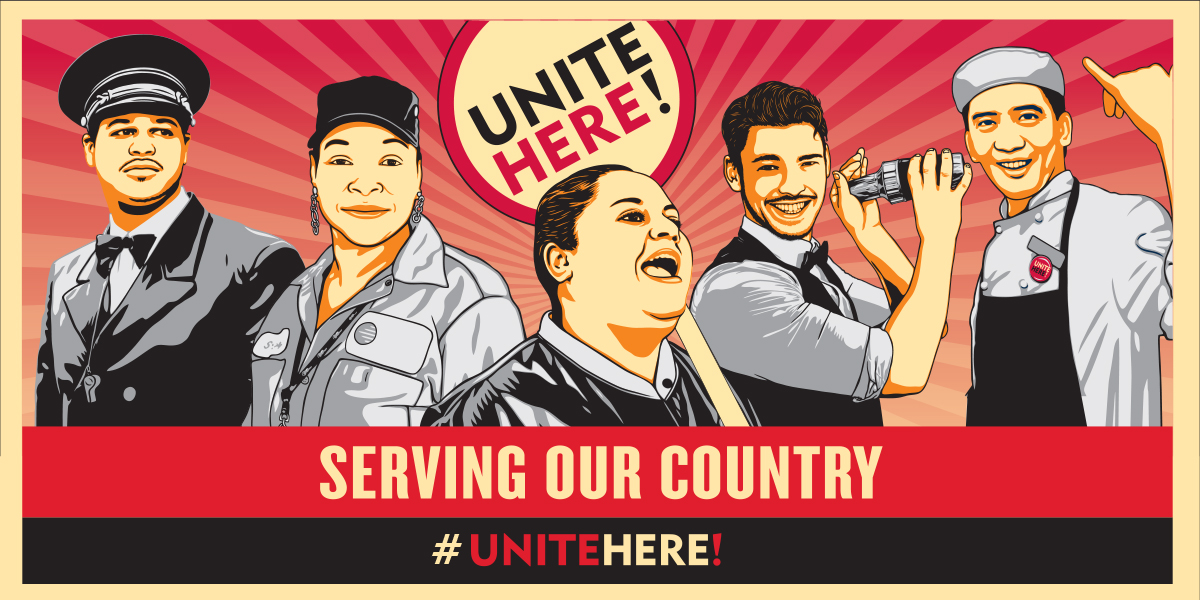

Share
On a Wednesday afternoon telepress conference, UNITE HERE International President D. Taylor and representatives from union locals discussed the unprecedented economic impact of the COVID-19 crisis on the 300,000 UNITE HERE union members in the U.S. and Canada in industries as diverse as airlines, hotels, theme parks, event venues, and food service.
The union reported that union members and their families are facing unprecedented layoffs and uncertainty. Taylor explained that anywhere between 80-90% of their union members have been laid off across the country. This may increase.
“Workers face potential loss of their health care, they will be food insecure, they’ll face housing insecurity,”said Taylor. “Workers generally still don’t have sick leave available to them.”
These same workers will lose health coverage at the end of the month. Taylor is asking congress for ”a bailout for the American worker, not just the American industry” and the proposed $1,000 is not enough, especially in places like New York, San Francisco and Miami, where “we need to get workers bailed out and secure.”
The union is calling for industry and Congressional leaders to act decisively, now. UNITE HERE further explained in a statement,
“While affected industries and corporations will rebound, this could be a catastrophic event for workers who are facing down an unexpected loss of their livelihoods and the federal government must act now to pass an immediate and comprehensive stimulus package.”
Taylor explained the majority of the workforce is female and people of color, exacerbating racialized inequity in the United States. Non-unionized service workers have it worse. “Hope is not a strategy” for the many workers who are having to choose between missing a paycheck or choosing to get sick, and the available social safety net has big holes.
Taylor noted that companies like Google and Wynn MGM have stepped up by paying employees and continuing to offer health insurance.
Anand Singh, President of UNITE HERE Local 2 in San Francisco commented that the three-week shutdown has devastated the city as hotels and convention centers shut down lat week. “Tens of thousands of working people who are already bludgeoned by the affordability crisis in the Bay Area are facing a health crisis now.” Most workers don’t have savings to cover one month of rent and have to decide which bills to pay. They are currently meeting with employers to protect healthcare.
Erik van Rossum, President of UNITE HERE Local 8 in Seattle says the workforce there has been hit incredibly hard. Unemployment numbers are increasing daily. Van Rossum reports that laid-off workers have struggled to receive or apply for unemployment benefits since the website is crashing and rife with errors. The state sick leave program won’t be providing checks for months due to backlog.
José Maldonado representing Local 100 in New York City, notes that New Yorkers and in particular Puerto Ricans have been through a lot, including the 2008 recession, 9/11, and the effects of natural disasters in Puerto Rico. While “we endured all that, this is totally different.”
Geoconda Argüello-Kline, Secretary-Treasurer of Culinary Workers Union Local 226 in Las Vegas notes that the “gaming industry completely shut down.” He demands that quarantine pay and resources for displaced families should be provided, in that “we need to have better protections for working families.”
Wendi Walsh, Secretary-Treasurer of UNITE HERE Local 355 Miami explained that of their 32,000 members, 90% are immigrant workers and predominantly women hailing from Caribbean nations. Normally this time of year is busy due to spring break but they have scene tourism industry go from at capacity to complete closure. Thousands are now facing a health crisis and the fear of eviction. “Quickly they will find themselves unable to feed their families and pay their rent,” Walsh says. Tens of thousands of workers are trying to apply for unemployment but the process is difficult and lengthy and in-person application sites are closed. Workers are expecting to receive $275 dollars a week, which isn’t enough. Walsh explained that if an overhaul of the unemployment process and an immediate increase in the benefits does not happen, “the new homelessness crisis will make the health crisis greater.”
Researchers at EPI note that expectations of just how many jobs will be lost are rapidly evolving.
“Goldman Sachs forecasts that the economy will contract by 2.5% over the first half of this year—which we estimate will translate, into a loss of 3 million jobs by June. An even bleaker forecast from Deutsche Bank, which is in line with projections from JP Morgan, suggests that 7.5 million jobs will be lost by the summer. We attempt to predict the state-level impacts of these losses using the midpoint of these two forecasts—an estimated 5.25 million jobs lost.”
In Minnesota, Department of Employment and Economic Development Commissioner Steve Groves says, “last year at this time the state had 2,100 unemployment insurance applications. Today [Wednesday] they’re at 50,000” with those numbers only increasing exponentially.
These numbers may become obscured or distorted limiting our ability to understand the real impact of the virus on jobs. The Wall Street Journal reported on Thursday that according to a state labor department official, “the Trump administration asked states to abstain from releasing unemployment-claims figures prior to the publication of a national compilation of weekly U.S. jobless claims.”

